Don't let Acne dominate your life. We have a unique treatment that could potentially change your life for the better. Get real results today.
Here is our basic start for acne prevention:
Put it on and take it off immediately when you first start out. You can increase it by the number of times of the week and how long you keep it on your skin. Just be careful not to burn yourself and cause scarring. If in doubt, put it on and take it off immediately.
Start the peels first and then add Retin A and then Azelaic Acid and Dapsone respectively slowly as tolerated. To approach specific pimples, you can be more aggressive and apply the home peels for 5-15 seconds daily. It will attack the specific pimples that are more noticeable and advanced.
You can increase as tolerated. For each of the products, you never want to put it on if you have redness or irritation. Retin A can make you sensitive to sunlight so it should only be applied during at nighttime. In addition, some people use Retin A as spot treatments for active, more noticeable pimples.
Do it once a week on Friday nights for starters. You can increase it as tolerated but you never put it on if you have redness or irritation. You can increase it to twice a day.
Use a 2% salicylic acid cleanser or a Glycolic 2% & Salicylic 2% combo. This helps prevent active acne. We also suggest an at home glycolic peel which is vital for both prevention and active acne.
Consider adding a topical antibiotic with something like clindamycin gel or erythromycin gel. During active acne, we suggest not using Retin A and Azelaic Acid or other medications in the beginning of treatment.
Using oral Doxycycline or Minocycline. If the pimples are starting to coalesce to nodules, you may add oral antibiotics to the mix.
Oral Isotretinoin (Accutane) can be considered but only a last resort.
Note: Individual results will vary. Images do not constitute a promise or representation of any particular outcome or experience.
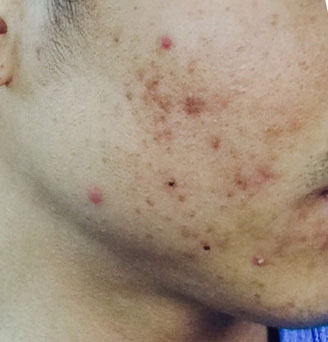
Before Acne Topical Skin Care Regime to Treat Active Acne
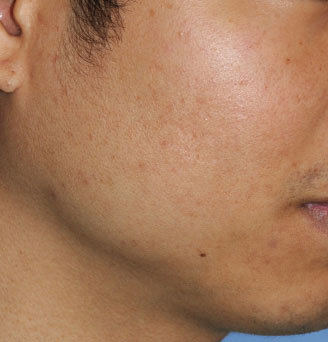
After Acne Topical Skin Care Regime to Treat Active Acne Breakouts after about one month of treatment
Topical retinoids (Retinol Complex, Retin-A, Retinoic Acid, Adapalene, Tazarotene), retinoids are vitamin-A analogues (variations) represent the backbone of acne treatment because they release mature comedones (blackheads and whiteheads are a specific type of acne called comedones), reduce microcomedone formation, and exert anti-inflammatory effects.
The first generation retinoid tretinoin (all-trans retinoic acid) and the synthetic third generation polyaromatics adapalene and tazarotene are approved for acne medical care by the USFDA whereas topically applied tretinoin, isotretinoin (13-cis retinoic acid) and adapalene are accredited in Canada and Europe.
Topical retinoids are relatively safe, quite different from the toxicity/negative side effects of their counterparts used systemically (i.e. orally).
Some side effects that can occur around the areas that you apply topical medications include redness, dryness, itching, and stinging. They usually happen when you start the treatment.
“My goal was to find a method to bring back a person’s natural youthfulness without the operated, unnatural look and that is why I have my patients bring in photos of them when they were age 5 to 30. My YoungVitalizer helps restore natural and youthful contours they haven’t seen in years.”
—Dr. Philip Young, Seattle Facial Plastic Surgeon



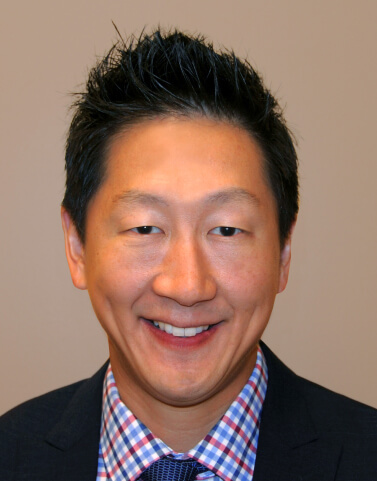
Reactions vary based on the way the topical medications are prepared by the drug company, type of products used to make the Retinoid, type of skin, frequency of usage (applying too frequently and not waiting until the inflammation and redness goes away), the way you apply it (you shouldn’t use it when you skin is irritated or damaged), use of moisturizers sensitive to, and environmental factors such as sun exposure or temperature (can make your sensitive to retinoids).
The broad anti-acne quality and the safety of using topical retinoids make them a great first-line treatment in most types of non-inflammatory and inflammatory acne. They are great as long-term medications, with no risk of inducing bacterial resistance (can be used for long periods and does not cause the bacteria to become resistant to the effects of the medication).
Note: Individual results will vary. Images do not constitute a promise or representation of any particular outcome or experience.
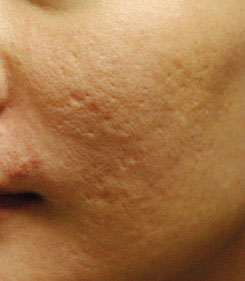
Before Acne Scar Vitalizer Treatment Cheek Box Car | Ice Pick Scars Left Side
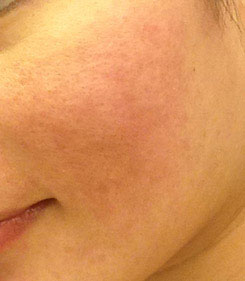
After Acne Scar Vitalizer Treatment Cheek Box Car | Ice Pick Scars Left Side
Retinoids get into your skin cells and bind to elements in your cells causing the nuclear receptors to perform benefits to your skin and fight acne. The cells grow and shed faster decreasing the chance of your hair follicles to become plugged by the slow growing and shedding skin cells.
The hair follicle has a sebaceous gland that exits right into the hair follicle tube/lumen/central tunnel. When the skin cells grow rapidly, they can plug up the hair follicle, the sebum (oils that keep your skin moist) and the skin cells. The bacteria, Propionibacterium Acnes, can then grow because it loves a space low in oxygen while feeding on sebum. Retinoids keep the cells from plugging up the hair follicle.
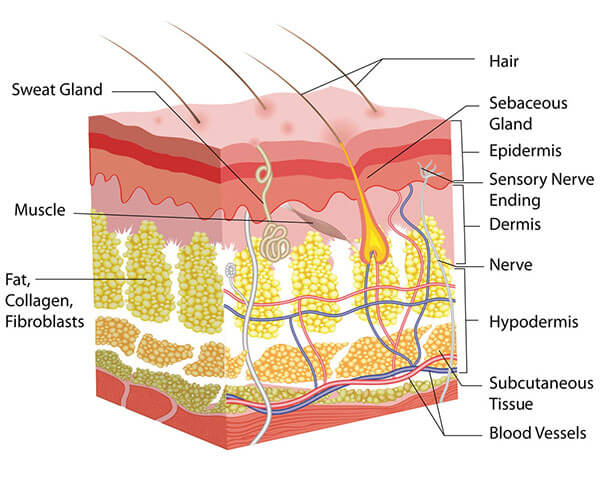
The Retinoids also exerts anti-inflammatory effects by affecting your inflammatory cells to be exuberant and less effective decreasing the reaction to the process and the propagation of the redness and swelling which makes things worse.
How long does it take to work? The initial effects take two to three 2-3 weeks and significant changes between four to six weeks. The maximal effects can take up to four months.
Depending on your skin type, you may want a particular type of retinoid. The first generation of retinoids can cause a lot of irritation. So, many people avoid them. You need to wait after each application of the retinoids before the redness and irritation subside before making the next application.
There are other formulations and variations of these topical retinoids that can be better tolerated. We have a formulation in our office that has a timed release that reduces this irritation Tri Retinol Complex.
Should you consider combining retinoids with other medications? It depends on the severity of your acne. Dr. Young will prescribe a retinoid, topical antibiotics, oral antibiotics and oral isotretinoin. We avoid Benzoyl Peroxide because of the possible cancerous changes it can expose you to. We may consider the topical medications of Clindamycin and Erythromycin. We like to use the oral antibiotics, Oral Doxycycline and Minocycline.
During your initial consultation with Dr. Young, will have the opportunity to ask questions and relay any concerns and fears with him and our patient care coordinators.
When you come in, we are going to discuss how aggressive you would like us to be with your laser resurfacing. We will talk about whether you would like us to do fractional resurfacing or traditional resurfacing.
You can email, call 425-990-3223 or text 425-341-3893 to set up an appointment. If you live out of town, we can schedule a phone consultation with you.
Here at AFPS, our staff will take the time and care to set you up with a great treatment plan. Treat yourself today to a beautiful more rejuvenated look today!
